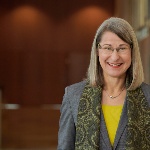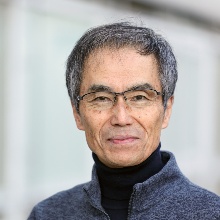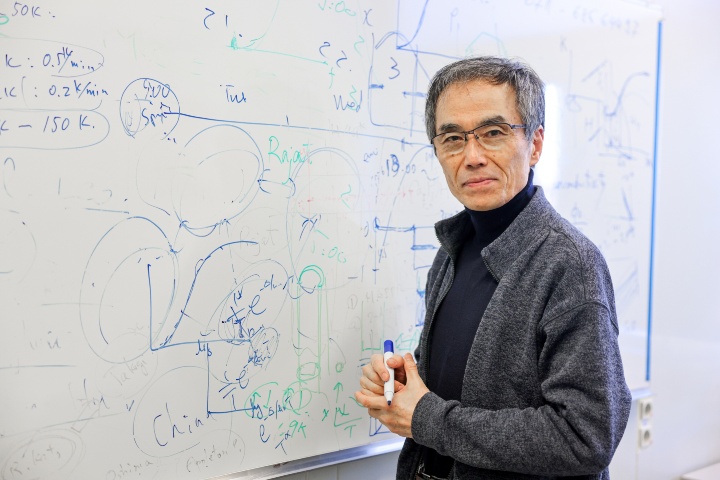Japanese physicist Prof. Kazushi Kanoda has received the prestigious Humboldt Research Award. He has been collaborating with research groups from the University of Stuttgart and the Max Planck Institute for Solid State Research since March working on a new fundamental state of matter known as quantum spin liquids.
"Germany and Japan are important research locations for this topic”, says Kanoda, explaining his choice, “and here in Stuttgart, the two working groups I am currently collaborating with are also based near to one another". During the joint research project, he is keen to collaborate with researchers from the University of Stuttgart’s 1st Physics Institute as well as the Max Planck Institute for Solid State Research (MPI-FKF) to investigate a special form of matter. The official project title is "Frustration-driven quantum phase transitions". The collaboration, which will be carried out with funding from the Humboldt Research Award, is initially scheduled to last for one year.
A very special form of matter
Quantum spin liquids are a very special form of matter related to the collective behavior of their electrons, or more precisely, their electron spins. Each electron is a small magnet the orientation of which can be described by the term "spin". In an ordinary solid, the interacting electron spins align exactly with each other at very low temperatures and are therefore organized. The case is different in quantum spin liquids, whose electron spins remain disordered if the temperature continues to sink. This disorder is the reason why such materials are referred to as liquids despite being solids: the molecules in liquids are more disordered than those in solids and the spins are more disordered at low temperatures in quantum spin liquids than in ordinary solids.
World-leading scientist
"Such a state of matter was predicted five decades ago”, Kanoda explains, “yet the final proof is still outstanding. The purpose of our collaboration is to provide this proof for certain organic materials.” Kanoda’s contribution to the joint research effort is his knowledge of the physics of strongly interacting electrons in organic solids. Dressel's working group specializes in the optical investigation of such organic materials and the trio is completed by Professor Hidenori Takagi's "Quantum Materials" department at the MPI-FKF, which works with inorganic materials to research the same topic as Kanoda. “The fact that Kazushi Kanoda is conducting research into molecular quantum materials here,” says Prof. Martin Dressel, who has headed up the University of Stuttgart's 1st Physics Institute since 2000, "represents a unique opportunity for groups based in Stuttgart. He is the world's leading scientist in this field, so his presence here is extremely inspiring for both students and colleagues alike."
Understanding fundamental questions of physics
Research into quantum spin liquids represents basic research and any future application potential is not yet foreseeable. "It is possible," Kanoda explains, "that a deeper understanding of these fundamental physical questions will lead to insights that could be used, for example, in quantum computers." Quantum computers that use spins for computing already exist and, whilst their technological basis has nothing to do with quantum spin liquids, these may pave the way for a new approach to how quantum computers may be able to use spin for calculations in the future.
About Prof. Kazushi Kanoda
Kazushi Kanoda (66) received his doctorate in physics from Kyoto University, Japan, in 1987. He initially worked as a research assistant at Gakushuin University, Japan followed by a stint as an associate professor at the Institute for Molecular Science, also in Japan beginning in 1991. He has been a professor at the Department of Applied Physics at the University of Tokyo since 1999. He received the IBM Japan Prize for his contributions to physics research in 1998, the JPS Award for Academic Papers on Physics in 2006, the MEXT Commendation for Science and Technology in 2019, and the Nishina Memorial Prize in 2020.
About the Humboldt Research Award
The Alexander von Humboldt Foundation awards up to 100 Humboldt Research Awards each year to internationally renowned researchers from abroad, in recognition of their overall contribution to science. The award winners are also invited to carry out a research project of their choice in Germany working closely with local researchers. These projects may run for between six months and a year. The award is open to nominees whose fundamental discoveries, new theories, or findings have had a significant impact both within their own field and beyond, and who can be expected to continue to achieve scientific excellence going forward.
Expert Contact:
Prof. Kazushi Kanoda, University of Stuttgart, 1st Physics Institute, Phone: +49 711 685 64497, email
Prof. Martin Dressel, University of Stuttgart, 1st Physics Institute, Phone: +49 711 685 64946, email

Jutta Witte
Dr.Scientific Consultant



